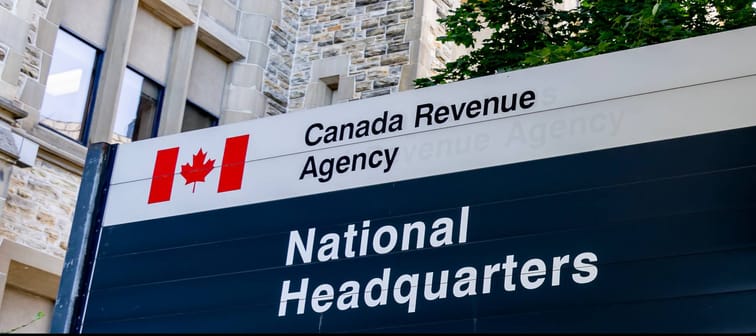Canada Revenue Agency: the administrator
The Canada Revenue Agency (CRA) collects taxes, administers tax laws and policies, and delivers benefit programs and tax credits. Your tax return is submitted to and processed by the CRA.
Empower Your Investments with Q Trade
Discover Q Trade's award-winning platform and take control of your financial future. With user-friendly tools, expert insights, and low fees, investing has never been easier.
Start Trading TodayDue dates
The filing deadline for individuals to file for your 2021 tax return is April 30, 2022. However, because that’s a Saturday, this year you have until May 2 to get your return in the mail and postmarked.
If you or your spouse carried on a business in 2021, your filing due date is June 15, 2022. Regardless of your filing deadline, if it is assessed that you have taxes owing, then you must pay your balance by April 30, 2022.
You must submit your tax return before the deadline to avoid interests and penalties.
Ways to file your tax return
If you’re not comfortable filing your tax return yourself, you can seek out a tax professional to file it. Most of these tax firms charge a fee, though there are drop-in centres (for example, on university campuses) that offer basic tax return services for free.
Alternatively, you can file online using one of the tax apps certified by CRA. Check out CRA's webpage for all electronic filing options available.
Finally, you can fill out the paper forms by hand. If you don't have a Social Insurance Number (SIN), then this is the only option for you as you are required to mail in your tax return.
More from Money.ca
- The best tax software to files with in 2022
- Simple tips to avoid the stress of tax time
- Did you receive CRB last year? How to know if you’ll take a hit at tax time
Unexpected vet bills don’t have to break the bank
Life with pets is unpredictable, but there are ways to prepare for the unexpected.
Fetch Insurance offers coverage for treatment of accidents, illnesses, prescriptions drugs, emergency care and more.
Plus, their optional wellness plan covers things like routine vet trips, grooming and training costs, if you want to give your pet the all-star treatment while you protect your bank account.
Get A QuoteTax slips
Tax slips are financial records that are relevant to your taxes. They are prepared by your employer, financial institutions and schools. Typically, you should receive most of your tax slips in the mail or electronically by the end of February, though some slips (for example, T3s) may not be available until the end of March. Here are some of the most basic tax slips:
T4: This is the tax slip that records your wage or salary.
T3: This is the statement of trust income. It's used to report amounts such as income and credits that the trust designates to the beneficiaries.
T5: This is the statement of your investment income. It provides information on dividends, interest and other sources of investment income.
T2202: This is the tuition enrolment certificate for people who are paying for school. You should refer to this when you claim your tuition tax credit.
T4A: This is the general statement for pension, retirement, annuity and other income. You should also find one in the mail if you have been awarded research grants, scholarships and bursaries in 2021.
Tax credits
The Canadian government provides various refundable and non-refundable tax credits for individuals. These tax credits reduce your tax burden, so make sure that you claim all the ones that you are eligible for.
Refundable tax credits are credits that will be paid to you even if you don't owe any income tax. These include the GST/HST credit and the Canada workers benefit (CWB).
Non-refundable tax credits, on the other hand, are only available to reduce your taxes owed. You don’t receive a tax refund if your non-refundable tax credits are more than the taxes you have to pay. Non-refundable credits include the basic personal amount, donations to charities and school tuition.
Here are some of the most common tax credits:
Basic personal amount: This is available to every individual and results in a minimum amount of income that can be earned without paying any federal income tax. In 2021, the basic personal amount is $13,808.
Canada employment amount: This is available to all Canadian resident taxpayers earning Canadian-source employment income. In 2021, you can claim either $1,257 or your total income earned in Canada, whichever is less.
Medical expenses: You can claim this tax credit on qualifying medical expenses. The CRA expects you to contribute $2,421 to your medical expenses, or 3% of your net income, whichever is less. The credit is then calculated as the difference between the total expenses and that threshold.
Interest on student loans: This tax credit is available if you have paid interest on student loans in the past year. Note that you can claim interest paid up to five preceding years, as long as you haven't claimed it in the past.
Tuition: This credit is available if you have paid eligible tuition in 2021.
If you’re filing electronically, don’t worry if you forgot to apply for all the tax credits available to you. Your tax preparation software has these tax credit rules built into it and will apply them automatically to your account.
What to do after submitting your return
You should register for "My Account for Individuals" with the CRA. This is a secure portal that lets you view your personal income tax and benefit information. Note that you must have filed your income tax and benefit return for the current tax year or the previous one before you can register.
Also, to be safe, you should keep your documents for 10 years in case of a CRA audit.
Reach out to CRA
The tax season can be stressful for first-time filers, but with some basic knowledge and professional help, it can be easier than you think. With some research and planning, you can complete your 2021 return with confidence.
And if you have any questions, you can always reach out to the CRA’s individual tax enquiries line at 1-800-959-8281.
Sponsored
Trade Smarter, Today
With CIBC Investor's Edge, kick-start your portfolio with 100 free trades and up to $4,500 cash back.








